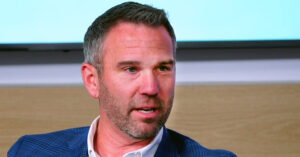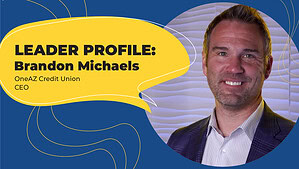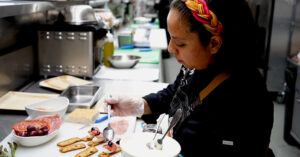Welcome back for the tenth episode of our Community Collaborative Series. In this episode, our leaders are back for important discussions surrounding diversity and inclusion efforts within the community and challenging the community to take action to help move the needle in the right direction.
In this episode, our leaders remind us that, even in the face of a global pandemic, every bit of awareness and effort counts. They discuss the topic of microaggressions and ways we can be more aware of the impact we have on others. They also discuss the impact the Covid pandemic has had on minority populations, reminding us of the ways we can support one another in moving toward a more equitable future.
Community Collaborative co-host/producer and Black Chamber of Arizona CEO Robin Reed is back with co-host/producer and Arizona Hispanic Chamber of Commerce CEO Monica Villalobos to lead today’s conversation with some notable change-makers in the community. They come together to provide insight and discuss steps that anyone can begin implementing within their organization and community.
Joining our co-hosts are three local leaders who bring powerful insight and experience to today’s conversation. The lineup of guests includes Linda Walton, diversity and inclusion expert and CEO at Achieving My Purpose, Idara Ekpoh, diversity analyst at Banner Health, and Marcus Denetdale, program manager of Construction in Indian Country at Arizona State University.
Over the course of the episode, Reed, Villalobos, Walton, Ekpoh and Denetdale discuss their experiences, answer important questions, and provide actionable advice organizations and individuals can take to break barriers to inclusion. Throughout the episode, they explore imperative questions including:
- What are the challenges for diversity and inclusion initiatives in the midst of the pandemic and how can we keep the momentum going?
- What are microaggressions, what impact do they have in the workplace and our communities, and how can we address them?
- What work do we still need to do, not only regarding diversity and inclusion efforts in general, but especially in showing support for communities severely impacted by the pandemic?
Don't Miss These Highlights
The conversation begins with Walton pulling on her own experiences to explain how, despite the challenges of Coronavirus and microaggressions, we can continue our efforts with diversity and inclusion. She discusses why it is imperative for companies to continue to align their purpose and practices as pertaining to diversity and inclusion.
She encourages people to remember that with a pandemic and increased remote work comes increased challenges for certain populations, including the lack of separation between work and home (3:12). She asks managers and training staff to be aware of the new challenges when it comes to virtual diversity and inclusion initiative and to be vigilant in keeping everyone engaged (3:43).
Finally, she touches upon the challenge of microaggressions in the workplace, highlighting that these often include “comments or actions that tend to be unconscious” that target a member of a marginalized group (4:23). She explores various examples of the ways we– often unknowingly– engage in, but can work through, microaggressions that project our biases and stereotypes, conscious or subconscious, onto others (5:05).
Reed jumps in to echo Walton’s message, reiterating that there are numerous organizations that have the right intentions, but don’t quite hit the mark when showing up to support their diversity and inclusion goals. Alignment here is imperative to success with these initiatives (8:00).
Together, Walton and Reed explore how Employee Resource Groups (ERGs) can serve as a safe place to express concerns, educate others and explore solutions. With that in mind, it is important for leaders within organizations to remember that these biases “exist for all of us,” as Walton says, encouraging people to acknowledge their existence and think before they act or speak. They also need to remain approachable and vigilant around these situations in the workplace to lay the foundation of a positive experience and equity for all (6:48).
Villalobos comes in to draw on her personal experiences with microaggressions to reiterate the responsibility that comes with being witnessing microaggressions toward you or others. “If you don’t stop it, then you’re actively reinforcing it,” she points out (9:20). So, she encourages people to use instances of microaggressions as “an opportunity to educate and change the course of thought” to help shift our mindset for the future (10:08).
Ekpoh joins the conversation to add insight regarding how organizations can approach diversity and inclusion training processes. One of the most important aspects of the process is providing team members access to both implicit bias and microaggression training to build an understanding around “each person’s role in creating a positive, inclusive work environment” (16:33).
The goal, she reiterates, is getting people to understand intention versus impact (17:54). It is important for everyone to understand the impact of the things they say to others. “Thinking before you speak is just a form of kindness,” she notes (18:15).
Ekpoh returns to the idea of using ERGs as a safe place to encourage intentional conversations around team members’ experiences and identities. There is power in employees of different situations and backgrounds learning about the experiences and culture of their team members (19:25). Reed adds how ERGs allow a more organic conversation around these experiences rather than trying to “dictate” that understanding among team members (23:25).
To wrap up the conversation, Villalobos and Denetdale turn their attention to highlight the struggles of local minority communities, specifically Navajo Nation, as a reminder that certain groups face certain financial and cultural barriers that others might not think about (26:37).
They discuss how “mentorship and internship are key” in helping the younger professionals grow in their respective careers (25:42). Therefore, Villalobos encourages leaders to remember, “anything we can do as it relates to the most vulnerable in our community is absolutely critical” (29:03). Villalobos concludes with a reminder of how important it is “for us all to rally behind each other and find out what we can do to help each other.”
Actions We Can All Take
Actionable takeaways from Episode 10 include:
- – Be aware of the struggles that team members are facing with the pandemic and working remotely (3:21).
- – Encourage involvement with virtual diversity and inclusion training (3:46).
- – Understand what microaggressions are.
- – Recognize that microaggressions exist and develop strategies to help address them (6:32):
- – Stop and think before speaking or acting
- – Recognize when a microaggression has occurred
- – Be approachable and non-defensive around conversations surrounding microaggressions
- – Interrupt prejudicial actions or attitudes from colleagues
- – Set a positive example when it comes to addressing microaggressions.
- – Align the organizational practices with the initiative purposes (8:00).
- – Use instances of microaggressions as an educational opportunity (10:31).
- – Recognize microaggressions within your own race and ethnicity (11:20).
- – Provide team members with implicit bias training (16:39).
- – Choose behaviors that are going to enhance relationships with others.
- – Shift the conversation from intention to impact (17:53).
- – Use employee resource groups as a place to safely share experiences, learn about disparities and ask questions (21:22).
- – Maintain strong partnerships with local community organizations (22:28).
- – Encourage employees “to bring their whole selves to work” (23:00).
- Use ERGs to build a foundation for communication and understanding.
- – Offer mentorships and internships to help build recruitment, especially with minority groups (25:42).
- – Be aware of cultural and economic barriers for some populations.
- – Strive to find objective news sources and share them with others (30:11).
- – Help correct historical narratives that are outdated (31:42).
This episode serves as a reminder that it’s never too late to make a change. As our leaders reminded us in today’s episode, we all have the capability and responsibility to do our part as we move toward making change for the future. Whether it is thinking before you speak, taking the time to learn about others in your community or workplace, or offering support to those in need, we all have a role to play as we continue to move forward.
We invite you to tune in as we go live every other Monday as we continue to bring in local leaders to share their experiences and insights in the realm of diversity and inclusion. We hope to inspire others to get involved in taking action and creating a solution. Remember, together we can make a change.
About The Community Collaborative
Community and business leaders and individuals who want to educate themselves on diversity issues will find the series informative and educational. And anyone who wishes to get involved will have ready access to resources featured in each program.
The video series may be streamed for free through the STN app. Viewers may subscribe through STN’s website or by downloading the STN app on the App Store or Google Play.
Each program in the series will provide details on how to get involved in featured activities and initiatives. To be featured in “The Community Collaborative” series or other STN programming, contact us at 480.967.7088.
Every day, there are leaders on the front lines of the fight to improve life in our community. STN provides the platform to tell their and their communities’ stories with video series on leadership philosophies and active efforts to make positive change in our region.





